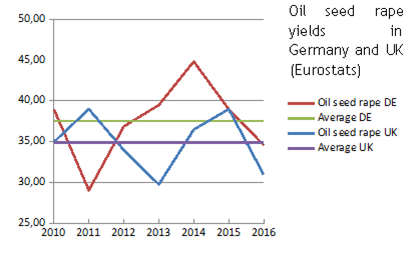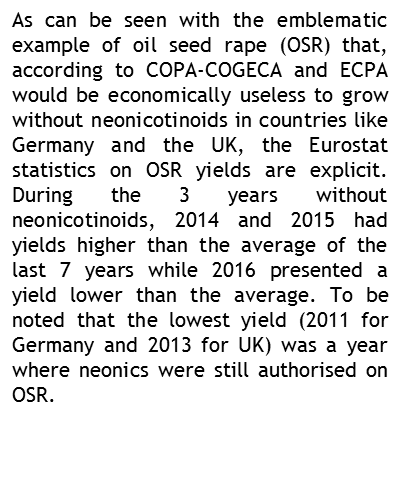The provision of false or incomplete information is a very common tactic the industry makes use of in order to cast doubt among decision makers[1]. After the November 2016 publication of 2 new EFSA reports reiterating the high risk of neonicotinoids on bees, the pesticide industry and industrial farming lobby are doubling their efforts to influence decision-makers and increase pressure on the European Commission to maintain their products on the market.
Today, the European Crop Protection Association (ECPA), the European Seed Association and the industrial farmers’ lobby COPA-COGECA are having an intense day of lobbying. Their goal is to flood European Commission staff as well as Members of the European Parliament with false information. Not surprisingly, no publicity was made about the 2 events and one of them is invite-only!
From 10h to 12h, staff from DG Sante, Agri, Envi, R&D and Grow are invited to COPA-COGECA's offices to listen to the ‘Lessons from the implementation of the neonicotinoids ban’. There, the privileged guests will receive propaganda in the form of the results of an impact assessment from the Humboldt Forum for Food and Agriculture (HFFA). Amazingly, this is the same HFFA who in 2013 presented a report with frightening figures just before the partial ban on these insecticides: up to 40,000 jobs lost in farms, up to 40% losses for maize yields, 20% for wheat or oil seed rape. Not surprisingly, their prophecy never arrived. In fact, what we can observe from Eurostat figures is that yields remained stable since 2013 (see graph here under).
Another arm of the misinformation campaign comes from consultant Steward Redqueen with a presentation of his Low Yield report. This report, commissioned by ECPA and COPA-COGECA was already presented in the EU parliament last November. The author itself explained then that the analysis was based on figures provided by ECPA and COPA-COGECA. In that case one can only wonder how credible the outcome of the analysis can be? Not surprisingly, the report shows how banning substances such as neonicotinoids may lead to carrots yields reduction up to...95%! Such a ridiculous figure destroys the credibility of the authors as well as that of the the contractors. Furthermore, this figure is in complete contrast with the results presented last month by Felix Wäckers, a scientists working on beneficial insects, in the EU Parliament: based on works carried out with farmers, he explained that planting the right flower species on flowering strips to attract beneficial insects have increased carrot yields by 30% while strongly reducing or eliminating the use of insecticides.
Later in the afternoon, apart from these speakers, MEPs will be graced by the presence of Norman Carreck, presenting: A scientist’s perspective on neonicotinoids. When looking at Mr Carreck’s publications in peer reviewed scientific journals, it is clear that he is not an expert at all on neonicotinoids: he has not a single original publication on the toxicity of neonicotinoids on bees. This is also a frequent industry strategy: to take a scientist that has no validated experience on a topic and to present him as an expert.
Martin Dermine, PAN Europe’s project coordinator on pollinators said: ‘The EFSA reports on neonics are clear: there is no safe use. They should lead to a full legal ban on neonics. We understand the pesticide and seed industry’s efforts to mislead decision-makers. But COPA-COGECA’s behaviour is irresponsible: since 2013, without neonics, farmers’ yields are stable. Neonicotinoids are expensive for farmers and destroy the environment and pollinators our agriculture relies so much upon.’
These views are shared by Francesco Panella, President of Bee Life, who added: “These two events are just a sign of fear from the pesticide and seed industry. Indeed, science has clearly proved the incompatibility with nature and uselessness of these molecules for agricultural production. They see their control on the production chain and market shares threatened. We can just hope that the Europeans will follow science and common sense and stop all uses of these products.”


Contacts:
- PAN Europe, Martin Dermine: +32 (0) 486 32 99 92, martin [at] pan-europe.info
- Bee Life, Francesco Panella: +32 (0) 10 47 34 16, info [at] bee-life.eu
